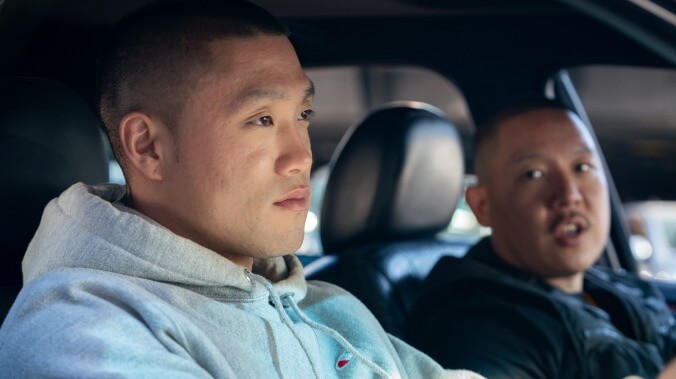Eddie Huang’s high school basketball melodrama Boogie bricks most of its shots


Note: The writer of this review watched Boogie on a digital screener from home. Before making the decision to see it—or any other film—in a movie theater, please consider the health risks involved. Here’s an interview on the matter with scientific experts.
The character of Alfred “Boogie” Chin, played by Taylor Takahashi in writer-director Eddie Huang’s Boogie, should be familiar to anyone who’s ever seen an underdog sports movie. Boogie is the kind of prickly hotshot who could lead a team to a championship, if they could only check their ego and get with the coach’s program. Typically, the Boogies of the world get it together in their picture’s third act, often after the audience finds out about their complicated home lives and big dreams for the future. They’re essential to the film’s worst-to-first narrative arc. But they’re rarely who the story’s about.
It’s easy to see why Huang would be drawn to someone like Boogie, since he himself has long had a reputation as a feisty phenom. Huang’s had success as a lawyer, a fashion designer, a restaurateur, a TV host, and a memoirist; the last of those gigs led to a sitcom, Fresh Off The Boat, loosely based on his childhood. All the while, he’s been outspoken, opinionated, and even combative, standing up for his artistic vision, his family’s Taiwanese immigrant roots, and his love of hip-hop. In Boogie—Huang’s feature-directing debut—the hero has a few things in common with his creator. He, too, is uncommonly gifted, loves Black culture, and pushes back against authority figures, including his own parents, who are also Taiwanese immigrants.
Boogie’s specialty is basketball. He’s talented enough to have been recruited by an elite New York private school, in need of a star for its hapless team. He’s hoping to take advantage of this exposure to get a scholarship to a top-ranked university, which will then launch him to an NBA career and make him and his hard-working mom and dad rich. There are problems with the plan, though. Boogie lacks the grades to attract the level of school he needs. He clashes with his coach (Domenick Lombardozzi), who wants him to be more of a team player. And his agent (Mike Moh) is pushing him to sign a lucrative contract to play pro ball in China, which may end his NBA dreams prematurely.
These are all realistic complications, common to a lot of promising young athletes. And Huang is clearly aiming for a movie that feels real, with naturalistic performances and lots of New York location footage. But by playing in this lower key, Huang sacrifices a lot of energy. Boogie starts at a plodding pace and never picks up much momentum, even as it builds to that staple of any sports melodrama: the Big Game.
It doesn’t help that Boogie’s script hits so many predictable beats—including said big game, which pits Boogie against one of the city’s hottest players, Monk (Bashar Jackson), right when the hero is juggling multiple crises. He has several dull fights with his parents about their expectations for him. His romance with a classmate, Eleanor (Taylour Paige), is threatened by his irrational jealousy of her ex-boyfriend. His best friend, Richie (Jorge Lendeborg Jr.), is mad at him for even thinking about skipping the game and abandoning his teammates, just when they need him most. All these clichéd conflicts come to a head at roughly the same time, just before tipoff.
Boogie does have some assets. The cast is very good, including the up-and-coming Paige and the late Jackson (a.k.a. the rapper Pop Smoke, who was murdered last year). And there are moments throughout that show some originality, including a charmingly fumbling sex scene between the virgin Boogie and the only slightly more experienced Eleanor, and a scene where Boogie’s father waxes rhapsodic about a 1989 French Open tennis match between Ivan Lendl and the Chinese American Michael Chang, talking about what Chang meant to his generation.
But too much of this film feels either generic or under-thought—from the high school English class where the kids discuss The Catcher In The Rye in the most perfunctory ways imaginable, to the ongoing tension over whether Boogie can get a decent scholarship offer. The elements that have to do with Boogie’s background or his own personal passions are few and far between. And even though the plot’s pretty thin, its scattered pieces rarely line up in a way that becomes taut enough to pull the audience along.
Worst of all, for most of the movie’s 90-minute running time, Boogie is a fairly passive character, to whom life just sort of happens, without him making many clear and confident choices to improve his own lot. In basketball terms, it’s not just that Boogie’s a star player who never passes the ball. He also rarely shoots. He mostly just stands in one place, listlessly dribbling.